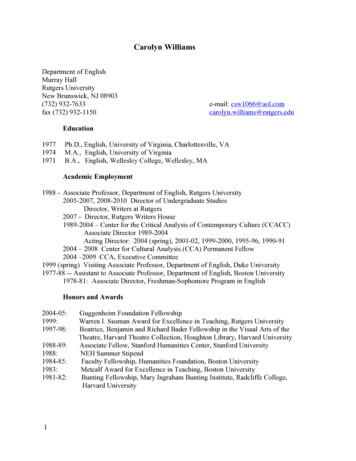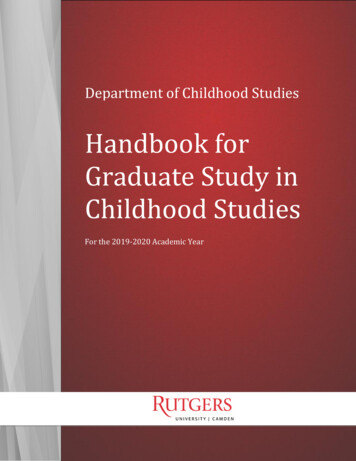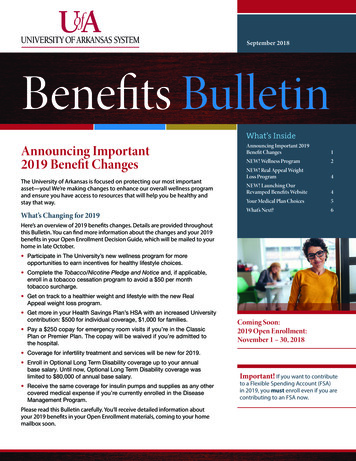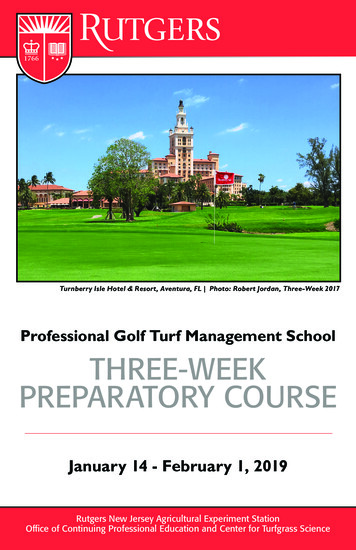
Transcription
Rutgers Center for Tobacco Studies - Tobacco Dependence Programin collaboration with theDivision of Addiction PsychiatryAnd co provided with Rutgers University Behavioral Health CareTraining AnnouncementOur training faculty includes doctoral-level, national experts in all aspects of tobacco control andtreatment – including areas of medical and behavioral-health tobacco treatment, tobaccoproducts and surveillance, epidemiology, messaging and communication, and program planningand evaluation. After completing the training, participants can expect to effectively treat patientsfor tobacco dependence and to provide other services to help organizations address tobacco use.The training format is virtual and encompasses both asynchronous (working with onlinematerials at your own pace) and synchronous (working virtually together as a group) sections.The asynchronous portion will be conducted through the Canvas online platform in whichparticipants independently complete a series of educational modules during the two weeks priorto our live, 2-day interactive Zoom sessions, May 2-3, 2022 from 8:00am-5:30pm ET. Thishybrid-approach allows busy professionals much needed schedule flexibility.Target Audience:This training is designed for Social Workers; Nurses; Psychologists; Physicians; Certified Counselors;Certified Alcohol and Drug Counselors; Marriage and Family Therapists; Health Educators; and anyother professionals who treat tobacco users.Self-Paced Online Modules: Available beginning on or about April 15th and due May 1stLive Zoom Session Dates: May 2-3, 2022Course runs 8:00am – 5:30pm ET on both dates.Visit www.tobaccoprogram.org for registration details. Registration will close April 1, 2022.Objectives: At the end of this training participants will be able to:1.Describe the impact that tobacco use, the tobacco industry, and FDA regulation has on society includingenvironmental/cultural factors2.Describe the individual impact that tobacco use has on individual health and addiction, co -morbidities andspecial populations3.Assess critical factors used in the development of a tobacco treatment plan including motivation anddependence4.Examine how to implement components of a comprehensive, evidence-based tobacco dependence treatmentintervention based on clinical practice guidelines including behavioral skills, social support, andpharmacotherapy including principles of community outreach and cultural sensitivity5.Practice and demonstrate the skills needed to conduct a clinical assessment, engage in individual counseling,motivational interviewing, and group counseling (both in-person and via telehealth)6.Discuss the principals involved in tobacco treatment program development and evaluation, clinical practiceguidelines, and evidence-based scientific literatureContinued Next Page
PROGRAM FACULTY:Michael B. Steinberg, MD, MPH is Professor and Chief in the Division of General Internal Medicine, Vice-Chair for Research atthe Rutgers Robert Wood Johnson Medical School, and Medical Director of the Rutgers Center for Tobacco Studies. Dr. Ste inberg isa Fellow of the American College of Physicians since 2010, is a former RWJ Foundation Physician Faculty Scholar (2006 -9), and isa past-president of the Association for the Treatment of Tobacco Use and Dependence (ATTUD). He maintains an active researchcareer in the areas of tobacco treatment interventions, has published over 90 peer-reviewed manuscripts, and has conducted studiesfunded by NCI, NIDA, RWJ Foundation, and the NJ Department of Health. His ongoing efforts include an NCI -funded R01 studyevaluating physicians’ attitudes and communication regarding E-cigarettes (PACE), coordination and training for the 10 New Jerseytobacco Quitcenters, and assisting with the Screen NJ Lung Screening initiative.Kim Jordan-Casarona, DSW, LCSW, LCADC is the Treatment Coordinator for the Rutgers Center for Tobacco Studies,and Instructor at the Division of General Internal Medicine at Rutgers-Robert Wood Johnson Medical School. Dr. Casaronaholds both a masters and doctoral degree in social work from Rutgers University. She has over 30 years of experience inbehavioral health and addiction treatment and has worked as a clinician and supervisor in a variety of treatment settingsincluding inpatient and outpatient programs, schools and private practice.Kristen E. Riley, PhD is an Assistant Professor at the Rutgers Graduate School of Applied and Professional Psychology (GSAPP).She received her Ph.D. in clinical psychology with a certificate in health psychology from the University of Connecticut and apostdoctoral fellowship in cancer prevention at Memorial Sloan Kettering Cancer Center (MSKCC). Her research aims to decreasestigma and increase health equity through tobacco cessation integrated care. She is an affiliate member of Center for Alcohol &Substance Use Studies, and the Center for Tobacco Studies, and is an associate member of the Cancer Institute of New Jersey i nCancer Prevention and Control.Jill M. Williams, MD is Professor of Psychiatry and Director of the Division of Addiction Psychiatry at the Rutgers UniversityRobert Wood Johnson Medical School in New Brunswick. She also holds faculty appointments at the Cancer Institute of New Jerse yand the Rutgers Center for Addiction Studies. The focus of Dr. Williams work has b een in addressing tobacco in individuals withmental illness or other addictions through treatment and systems interventions. In 2015 she was the recipient of the Remarkab leAchievement Award of the NJ Psychiatric Association. She also is recent past Chair of the APA Council on Addiction Psychiatry.Marc L. Steinberg, PhD is a clinical psychologist and the director of the Tobacco Research & Intervention lab. He is Professor ofPsychiatry and Associate Director, Division of Addiction Psychiatry at Rutgers Robert Wood Johnson Medical School. The majorityof his research focuses on tobacco use and dependence, including tobacco dependence treatment development, tobacco use insmokers with psychiatric comorbidity, the relationship between smoking and task persistence/distress tolerance, and motivationalinterviewing as an approach to encourage smokers to make a quit attempt. More recently, Dr. Steinberg has begun examining tob accouse and psychiatric comorbidity in patients using cannabis for therapeutic purposes. Dr. Steinberg is active in the Society forResearch on Nicotine and Tobacco (SRNT) where he serves on the Treatment Network’s Advisory Committee. He is a Deputy Editorfor the journal Nicotine & Tobacco Research and a Consulting Editor for Psych ology of Addictive Behaviors.Mary Hrywna, PhD, MPH is an Assistant Professor, Rutgers Center for Tobacco Studies & Rutgers School of Public Health. Shehas over 20 years of experience working at universities coordinating and conducting behavioral scienc e and policy research. Herresearch areas and interests include tobacco regulatory science and tobacco control policy, particularly policies that may pr event orreduce tobacco use among young people and other special populations. Dr. Hrywna is the Principa l Investigator of a contract fundedby the New Jersey Department of Health intended to conduct tobacco -related research and surveillance in the state including the NewJersey Youth Tobacco Survey and repeated point of sale data collection.Manish S. Patel, MD is an Associate Professor of Medicine and Vice-Chief of the Division of General Internal Medicine at theRutgers – Robert Wood Johnson Medical School. He was elected to Fellowship in the American College of Physicians in 2018. Hehas published numerous peer-reviewed manuscripts, including in the field of tobacco treatment. As a hospitalist, Dr. Patel isespecially interested in the treatment of tobacco dependence in the hospitalized and perioperative setting, and he has given lectures onthis topic in various regional academic settings.Olivia A. Wackowski, PhD, MPH Associate Professor, Rutgers Center for Tobacco Studies, is a health behavioral scientist with aresearch concentration in the area of tobacco control. Her research interests lie in the area of tobacco communication, tobac coproduct perceptions, risk perceptions, and product use trends. Using both qualitative and quantitative methods, her research informstobacco control policy including FDA regulation of tobacco and fits under the scope of tobacco regulatory science.Cristine D. Delnevo, PhD, MPH is Director of the Rutgers Center for Tobacco Studies and Professor at the Rutgers School ofPublic Health. She is currently the Principal Investigator of several R01s grants from NCI focused on e-cigarettes communications,tobacco use patterns among young adults and tobacco 21 laws. She is also the multiple PI of the UPenn/Rutgers Tobacco Center ofRegulatory Science (TCORS). This 5-year, 18 million award examines the effects of advertising, packaging and labeling onperceptions, use and exposure of combustible tobacco products.Continued Next Page
Michelle T. Bover Manderski, PhD, MPH is Associate Director of Survey Methods and Data Analysis at Rutgers Center forTobacco Studies and Instructor of Epidemiology, Department of Biostatistics and Epidemiology at Rutgers School of Public Heal th.Dr. Bover Manderski’s research interests include survey methodology, measurement of health-related behaviors, cancerepidemiology, and epidemiology of tobacco use. During her 10 years at the Center for Tobacco Studies, she has led or collabo ratedon numerous tobacco research projects, including surveillance, clinical and program evaluation, and experimental studies.M. Jane Lewis, DrPH is an Associate Professor, Rutgers Center for Tobacco Studies & Rutgers School of Public Health. She is thePrincipal Investigator of the Trinkets and Trash project (www.trinketsandtrash.org), a surveillance system and archive of tobaccoindustry marketing materials and products. She has over 20 years of experience in tobacco control and conducts research exam iningthe innovative marketing strategies of the tobacco indu stry with a particular emphasis on the use of direct marketing strategies. Dr.Lewis is the Principal Investigator for Project 4 “Examining Product Descriptors in Natural American Spirit Cigarette Marketi ng” ofthe Rutgers/UPENN Tobacco Center of Regulatory Science (TCORS).Kevin Schroth, JD is an Associate Professor with Rutgers University's Center for Tobacco Studies and School of Public Health. Heteaches public health law, and his research focuses on how tobacco regulatory science can improve tobacco c ontrol policy. Hepreviously served as an attorney with the New York City Health Department, directing tobacco control policy for the City. Dur ingthis tenure, Kevin played a principal role in drafting and passing more than a dozen tobacco control laws. H e also developed policiesdesigned to reduce consumption of sodium and sugary beverages. Before concentrating on public health, he worked as a commerci allitigator, and clerked for federal and state judges in New Jersey. Kevin earned his JD from Rutgers La w School and BA fromBucknell University.Heather Jordan, MPH, CPH, MCHES, is a Research Program Manager and Health Educator at the Rutgers Center for TobaccoStudies at Rutgers, The State University of New Jersey. Ms. Jordan is a lung cancer screening and tobacco cessation health educatorfor ScreenNJ. She holds a Master's Degree in Public Health with a concentration in Maternal and Child Health. Ms. Jordan isCertified in Public Health (CPH), a Master Health Education Specialist (MCHES), and is trained as a Tobacco Treatment Specialistthrough the Rutgers Tobacco Dependence Program.There is no commercial support for this activity. Dr. Steinberg had previously received an unrestricted research grant fromPfizer in 2006, and had been a consultant for Arena Pharmaceuticals regarding tobacco treatment medications. Dr. Williamshas received research grant support from and has been a consultant to Pfizer. All individuals who affect the content ofcontinuing education activities are required to disclose to the audience any real or apparent conflict of interest related to theactivity. The activity faculty are further required to disclose discussion of off-label/investigational uses in their presentations.These disclosures will be made to the audience at the time of the activity.Registration is available on-line: www.tobaccoprogram.org. Should you learn in advance that you will be unable to attendtraining for which your registration has been confirmed, please email Training Staff at training@cts.rutgers.edu so the spacewe have reserved for you can be made available for another participant. Participants who sign in on time and are present forthe entire training session will receive documentation of attendance. For further information and to discuss possible provisionsfor any physical disability (ADA) please contact training@cts.rutgers.edu.Continued Next Page
Professional Contact Hours provided by UBHC forPhysicians, Nursing, Psychology, Social Work, Professional Counselors, Marriage and FamilyTherapists and Licensed and Certified Alcohol and Drug CounselorsProfessional Contact Hours Provided Sign on prior to the start time and be present for the entire session each day. Please grant CCE 7-10 days to confirm and process attendance in RBHSCloudCME prior to logging into thesystem to complete the post-program evaluation and download CE Certificate or General Attendance Certificate. Certificate Fee for Professional Contact Hours is 40 payable via credit card in RBHSCloudCME after completingpost-program evaluation. Partial credits will not be issued to participants arriving late or leaving early.*As per DCA/ADCC regulations, these boards only allow 50% of their renewal coursework to be asynchronous.Please check with your individual boards on asynchronous and synchronous learning formats for continuingeducation.In support of improving patient care, this activity has been planned and implemented by RutgersBiomedical and Health Sciences and the Center for Tobacco Surveillance and EvaluationResearch and the Division of Addiction Psychiatry. Rutgers Biomedical and Health Sciences isjointly accredited by the Accreditation Council for Continuing Medical Education (ACCME),the Accreditation Council for Pharmacy Education (ACPE), and the American NursesCredentialing Center (ANCC), to provide continuing education for the healthcare team.Physicians: Rutgers Biomedical and Health Sciences designates this live activity for a maximum of 36.0AMA PRA Category 1 Credits . Physicians should claim only the credit commensurate with the extent oftheir participation in the activity.Nurses: This activity is awarded 36.0 contact hours (60 min CH).Psychologists: This course is approved for 36.0 CE Credits. Intermediate level. Rutgers Biomedical and HealthSciences is approved by the American Psychological Association to sponsor continuing education for psychologists.Rutgers Biomedical and Health Sciences maintains responsibility for this program and its content.Social Workers (The New Jersey Board of Social Work Examiners): This program is approved for social workcontinuing education hours by Rutgers University Behavioral Health Care in accordance with New Jerseyadministrative code 13:44G-6.4 and recognized by The New Jersey Board of Social Work Examiners. This program isapproved for 36.0 general continuing education hours.Professional Counselors (LAC/LPC): This course will count for 36.0 recertification credits forProfessional Counselors as The Certification Board of NJ, Inc. Approval number for this course is#200050322REC36REC.Licensed and Certified Alcohol and Drug Counselors (CADC/ LCADC): This course will count for 36.0recertification credits for Marriage and Family Therapists as approved by The Certification Board of NJ, Inc. Approvalnumber for this course is #200050322REC36REC.Marriage and Family Therapists (MFT/LMFT): This course will count for 36.0 recertification credits for Marriageand Family Therapists as approved by The Certification Board of NJ, Inc. is Approval number for this course is#200050322REC36REC.If a participant or potential participant would like to express a concern about the continuing experience with RutgersUniversity Behavioral Health Care, they may call or e-mail cce@ubhc.rutgers.eduContinued Next Page
Professional Contact Hours provided by the American Association for Respiratory Care for RespiratoryTherapists and the Rutgers School of Public Health for Certified Health Education SpecialistsIf any participant has additional inquiries regarding continuing education credits for Respiratory Therapists or CertifiedHealth Education Specialists, email training@cts.rutgers.edu.Continuing Respiratory Education (CRCE) system of the American Association for Respiratory Care (AARC):This program has been approved for 32.58 hours Continuing Education Credits. Course # 186485000.Certified Health Education Specialists: The Rutgers School of Public Health, Center for Public Health WorkforceDevelopment is designated as a multiple event provider of CECHs by the National Commission for Health EducationCredentialing. This program will be awarded 32 CHES / MCHES credits. Program ID: 16616. Event ID: Event 19051.AGENDAWeek 1 – Self-PacedTobacco Epidemic;Combusted and NonCombusted TobaccoProductsWeek 2 – Self-PacedBehavioral Change Skills& Treatment StrategiesDay 1 ReviewWelcome/Course OverviewHomework/CTTS/ATTUDDay 2 ReviewBehavioral Change Skills& Treatment StrategiesExerciseTobacco Epidemic andCombusted Tobacco ProductsTobacco Harm ReductionStatistics/EpidemiologyNeurobiology of tobaccoaddictionTobacco Policy and FDARegulationNon Combusted and TobaccoHarm ReductionNeurobiology of TobaccoAddictionStatistics/EpidemiologyTobacco Policy and FDARegulationEvidence-based treatmentand Public Health ServiceGuidelinesNRT PharmacotherapyEvidence-based treatment andPublic Health Service GuidelinesGroup Counseling Skillsfor Treating TobaccoDependence VideoMedical ComplicationsCaused by Tobacco andEnvironmental TobaccoSmokeNon-NicotinepharmacotherapyMedical Complications Causedby Tobacco and EnvironmentalTobacco SmokeTreatment planning andrelapse preventionExerciseTobacco industry tacticsCase VignettesTobacco industry tacticsProgrammatic IssuesLung Cancer ScreeningMotivational InterviewingLung Cancer ScreeningMotivational InterviewingFAQ’s aboutMedications, MedicationMetabolism, andAlternative TherapiesNRT PharmacotherapyGroup Counseling SkillsforTreating TobaccoDependenceFAQ’s about Medications,Medication Metabolism, andAlternative TherapiesNon-nicotine medicationsCase VignettesAssessment ToolsIntroduction toTreatment PlanningDiscussionIntro to Treatment PlanningAssessment Tools ExercisePharmacotherapy CasesContinued Next PageEvaluation
*Take-home, clinical assignment will be part of the training activities. The time for completion for theassignment is estimated to be 6 hours total.MAY 2-3, 2022CTTP TRAINING REGISTRATION PROCESSRegistration Form must be completed in full, by each participant.You may register for this training online at www.tobaccoprogram.orgIf you have any questions please email training staff: training@cts.rutgers.eduRegistration is complete AFTER a confirmation email has been received by the participant.*CONFIRMATION EMAIL WITH DIRECTIONS WILL BE SENT TO EACH PARTICIPANTAFTER PAYMENT HAS BEEN RECEIVED.Registration DetailsPlease email training staff if you would like to discuss possible accommodations for disability (ADA)Course Confirmation ProcedureCourse confirmation via email will be sent to participants, up to one week prior to the course.If you do not receive confirmation, please email training@cts.rutgers.edu.Cancellation PolicyAll attendees are asked to please notify the Training Staff in writing, as soon as possible, regarding a cancellation ofattendance. Seating is limited and if a cancellation is received, there may be an opportunity for another participant toattend the training.Additional InformationCertificates of attendance will only be given to those participants who complete the training in full.Final Page
Kim Jordan-Casarona, DSW, LCSW, LCADC is the Treatment Coordinator for the Rutgers Center for Tobacco Studies, and Instructor at the Division of General Internal Medicine at Rutgers-Robert Wood Johnson Medical School. Dr. Casarona holds both a masters and doctoral degree in social work from Rutgers University. She has over 30 years of experience in










